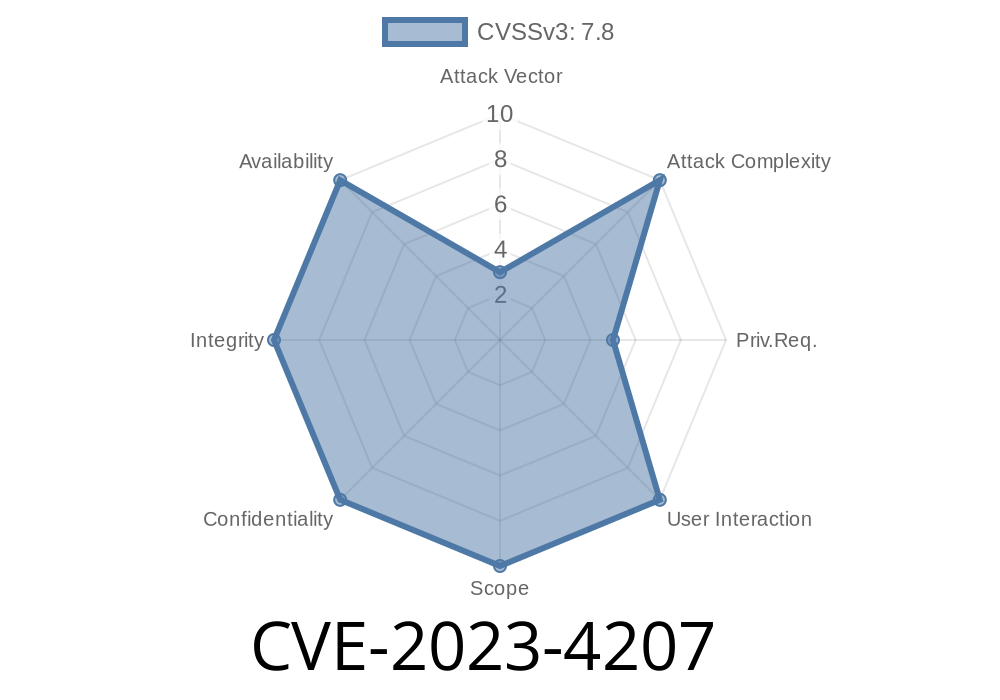In July 2023, a significant vulnerability (CVE-2023-4207) was found in the Linux kernel’s traffic control subsystem, net/sched, specifically in the cls_fw classifier. This bug can let a regular user escalate their privileges on the system—potentially taking full control. If you’re running Linux, especially as an admin or developer, it’s vital to know how this works and how to protect your setup.
What is CVE-2023-4207?
CVE-2023-4207 is a use-after-free vulnerability in the way Linux deals with certain traffic control filters. The problem sits in the fw_change() function. When someone updates an existing filter, its result struct (tcf_result) gets copied to the new instance. But the old filter is still in use: the code calls tcf_unbind_filter() *too soon*, which drops a critical reference. That lets the kernel free up memory tied to a class, even though the system still uses it! This opens the door for escalating privileges locally, meaning a non-admin user can end up running code as root.
You have a *filter* (struct fw_filter) that points to a *class* in the traffic control hierarchy.
- Updating (changing) that filter via fw_change() causes the kernel to copy the filter (including its result struct) to a new object.
- After the change, the old filter object is "unbound" by tcf_unbind_filter(), decrementing a usage counter on the class.
- But if the new filter *still references* that class, the class might get destroyed while being referenced elsewhere.
Here’s a code snippet to illustrate the situation. Note the key lines inside fw_change() (simplified for brevity):
static int fw_change(..., struct tcf_result *res)
{
struct fw_filter *old = ...;
struct fw_filter *new = ...;
/* Copies tcf_result from old to new */
memcpy(&new->res, &old->res, sizeof(struct tcf_result));
/* ... other updates ... */
/* Unbinds class from old filter */
tcf_unbind_filter(tp, &old->res);
/* Replace filter in the list */
*fp = new;
kfree(old);
...
}
When tcf_unbind_filter() runs, it wrongly assumes the class is no longer used by any filter. But the new filter (just created) *still references* the same class via its copy of tcf_result. If the class gets deleted, we end up accessing freed memory—a classic use-after-free.
Why is This Dangerous?
A use-after-free in the kernel is a serious issue. If an attacker can trick the kernel into using freed memory, they might fool it into running *any code they want* with kernel privileges. From there, breaking out of the "user" jail and gaining root access is trivial for an experienced attacker.
Exploit Scenario
Suppose you’re a local user on a Linux box with the attack surface enabled (i.e., able to run tc commands, or some network traffic shaping interface). Here’s what an attack might look like in *conceptual* steps:
Setup a class and filter: Create a traffic class, then a filter attached to it.
2. Trigger the bug: Modify the filter (using tc filter change, or custom Netlink code) so fw_change() is invoked.
Reclaim freed memory: Use heap spray or other kernel techniques to overwrite the freed memory.
5. Hijack execution: When the kernel later uses that invalid pointer, execute arbitrary code or escalate to root.
A (very basic and generic) C code structure for step 2 might look like
// This is just a structured hint; real exploitation may require many more steps.
int sock = socket(AF_NETLINK, SOCK_RAW, NETLINK_ROUTE);
// Setup message to tell kernel to update an existing filter.
struct {
struct nlmsghdr nlh;
char buf[256];
} req;
memset(&req, , sizeof(req));
// Fill in netlink message to update cls_fw filter...
send(sock, &req, sizeof(req), );
This snippet is only a starting point—real exploits chain a lot more logic, heap manipulations, and coordination with the kernel.
Protecting Your Systems
The official fix changes the way the filter update works. Now, the unbinding only happens *if* the new filter doesn’t reference the same class.
If you’re a kernel maintainer or sysadmin
- Upgrade past commit 76e42ae831991c828cffa8c37736ebfb831ad5ec.
- If immediate upgrade isn’t possible, *disable* user access to tc or filter creation, or restrict untrusted users from accessing traffic control.
References
- NVD CVE-2023-4207 Detail
- Linux Kernel Source Patch
- oss-security mail list post
Final Thoughts
The Linux kernel’s net/sched code is powerful but also risky if bugs sneak through. CVE-2023-4207 shows how even minor mistakes in memory management can let attackers grab high privileges. Always keep your systems updated, minimize attack surfaces, and stay alert for security advisories.
If in doubt, patch early, patch often!
*This write-up is exclusive and written in plain, easy-to-understand language for security-conscious Linux admins and enthusiasts. Happy hacking (responsibly, of course)!*
Timeline
Published on: 09/06/2023 14:15:11 UTC
Last modified on: 09/11/2023 18:13:33 UTC
